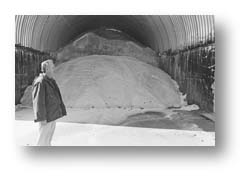Economics Of 'Winter'

Snow. You know, that white stuff that used to fall in winter? Well the lack of it, coupled with this winter's balmy temperatures have left some feeling cheated.
And it's not just skaters and sledders. Some year-round business owners who depend on the trials of winter as much as the busy summer have seen income drop because of the non-winter of '98.
"It definitely has affected our business," said Victor DiPietro, who has run Amagansett's V&V Auto Service Center for more than 20 years. Not only have cars had an easy ride . . . but the salt-free roads have kept them relatively clean, hanging V&V's relatively new car wash pretty much out to dry.
"Normally, you start having cold weather in November," said Mr. DiPietro. "What it does is it reminds people to winterize their cars . . . everything from snow tires to belts and hoses. We didn't have that this year."
Fewer Repairs
Regular winter repairs, such as dead batteries, sputtered-out starter motors, and snow-related fender-benders have been scarce at other service stations as well. At V&V, Mr. DiPietro said he had to trim back his mechanics' hours for the first time.
Less than an inch of snow fell on the South Fork this year, according to Richard Hendrickson of Bridgehampton, an observer for the National Weather Service. The average winter snowfall here is 24 inches.
"I've had my station here for 67 years," Mr. Hendrickson said. "I've had months without snow, but I've never had a whole winter without snow. That's quite a record-breaker."
Other White Stuff
"Through the entire winter months of December, January, February, and even so far into March, we're running from five to seven degrees above normal," Mr. Hendrickson said.
While there has been no snow removal work, the East Hampton Town Highway Department has faced other white stuff this winter: some 1,700 tons of road salt piled up in the town's highway barns.
The lack of snow has kept the Highway Department's budgetary coffers well-stocked, however. The town had earmarked $165,000 for snow removal expenses this year, including potential overtime for department employees, equipment, and materials.
Downside
"Very, very little" of that has been touched, said Christopher Russo, Town Highway Superintendent. Since money in the snow-removal budget is not transferable to other budget lines, surpluses will be carried over into next year's budget, perhaps reducing the amount of money that the department will have to raise by taxes.
The Highway Department emerg ed from last year's mild winter with a sizable surplus as well. The winter of 1995 blanketed the South Fork in snow and put the department $105,000 over budget for snow removal.
A winter without snow lessens some of the headaches for the department, but it also has its downside, Mr. Russo said. "The guys lose their edge. The guys don't get any training."
Ups And Downs
For those with small snow-plowing businesses, or even those with a snow plow, a pickup, and a few driveway jobs, the winter of 1995 was lucrative; this year such a possibility has been nonexistent.
"You know, it's been up and down. That's the way the winters are," said Randy Reichart, whose Hamptons Auto Collision on Springs-Fireplace Road in East Hampton offers snow plowing as one of its services.
"It's Gravy"
Mr. Reichart said the snow-plowing business is more of a bonus for people who have the equipment, not a necessary part of their income. "Hey, if it comes in, it's gravy. If it doesn't, it doesn't.
The mild winter has cut into his auto-body work, Mr. Reichart noted, as well.
As for farming, Mr. Hendrickson said the mild winter could mean trouble come the growing season.
"Usually, they say if the ground gets good and frozen over the winter, it breaks up better, plows over better," said Mr. Hendrickson. "It also kills a lot of the bugs that hibernate under the ground. . . . I'm pretty sure there will be a big infestation of insects."
